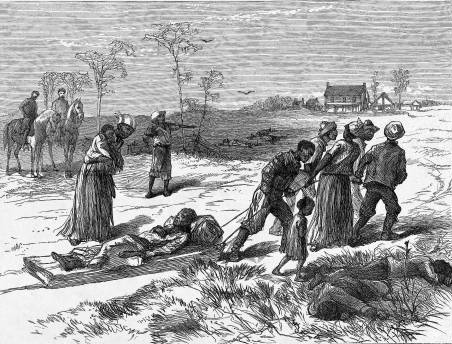In United States v. Cruikshank, 92 U.S. 542 (1876), the U.S. Supreme Court threw out the convictions of Cruikshank and other whites who, during a dispute about a gubernatorial election in Louisiana, killed about 100 blacks in the Colfax Massacre and were subsequently charged with conspiring to deprive those blacks of their constitutional rights.
Supreme Court addressed First Amendment freedom in Colfax Massacre case
Although scholars usually cite this case as an example of very restrictive reading of the guarantees of citizenship established in the 14th Amendment, the case is also important in First Amendment jurisprudence for the statements made by Chief Justice Morrison R. Waite regarding the First Amendment freedom of peaceable assembly.
Consistent with such decisions as those in Barron v. Baltimore (1833), which the court issued prior to adoption of the 14th and 15th amendments, Waite sought to limit the rights of national citizenship by distinguishing it from state citizenship.
Waite said First Amendment applied only to national government
He argued that the right to peaceable assembly was a natural right that preceded the adoption of the Constitution, rather than a right granted by it. For Waite, the First Amendment prohibited Congress from abridging the right to assemble but “was not intended to limit the powers of the State governments in respect to their own citizens, but to operate on the National government alone.”
The court found that while Congress has the right to protect individuals meeting for purposes of petitioning the national government, the indictments had made no claim that the individuals arrested and charged were attempting to deny this right to anyone or that the actions in this case were specifically directed at individuals on the basis of race.
Consistent with the distinction the court would later draw between state and private action in the Civil Rights Cases (1883), Waite wrote in the high court’s decision that the enforcement clause was not designed to protect individuals against the actions of other individuals but only from those of the state itself.
Vague charges deprived arrested individuals of due process
Waite further criticized the indictments for not enumerating the crimes being indicted and for not demonstrating that these crimes had been committed on the basis of race. Given that the charges were so vague, those indicted had been deprived of due process.
Justice Nathan Clifford’s concurring opinion focused on this vagueness of the charges rather than on the validity of federal attempts to protect private rights.
John Vile is a professor of political science and dean of the Honors College at Middle Tennessee State University. He is co-editor of the Encyclopedia of the First Amendment. This article was originally published in 2009.

